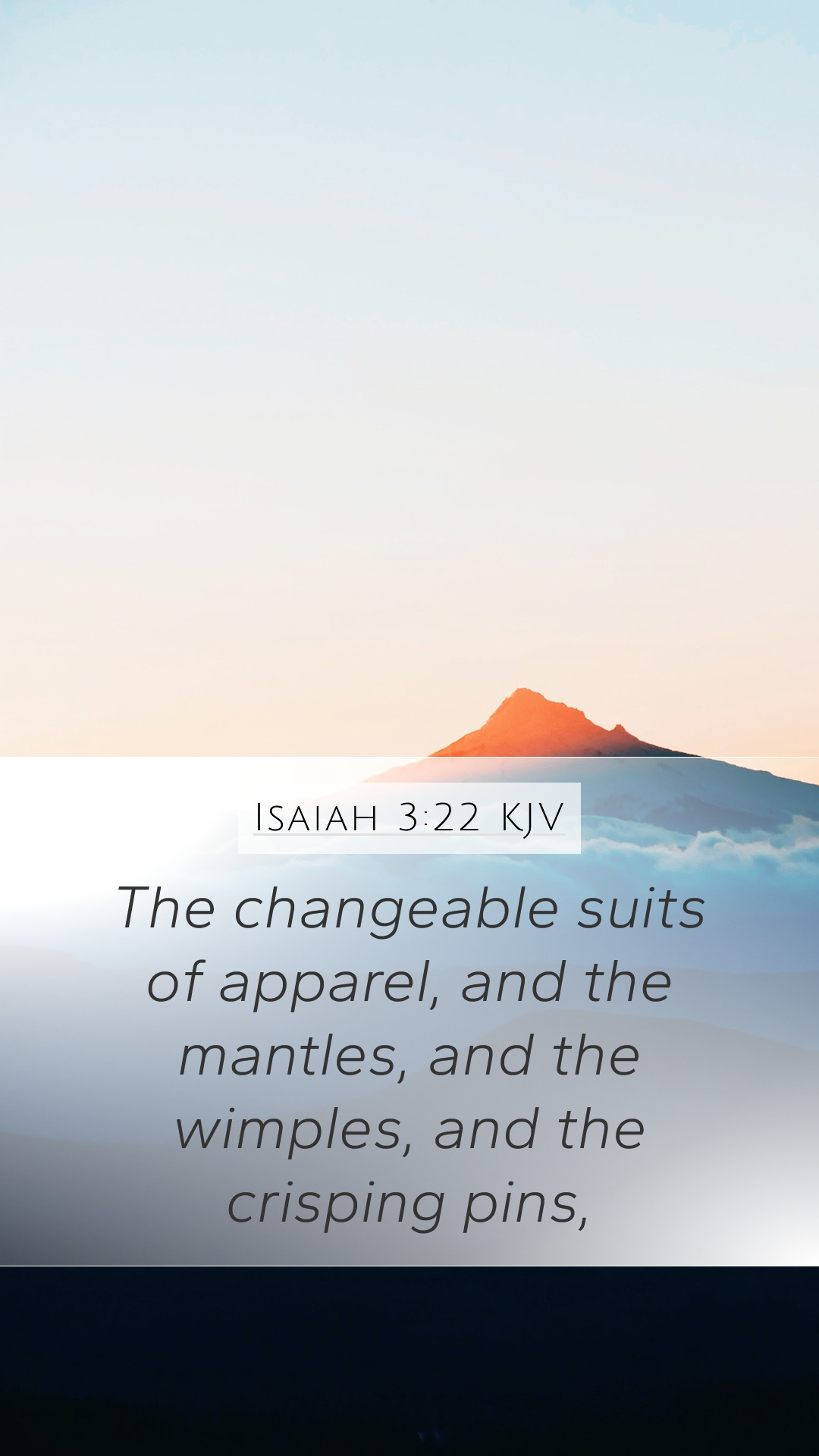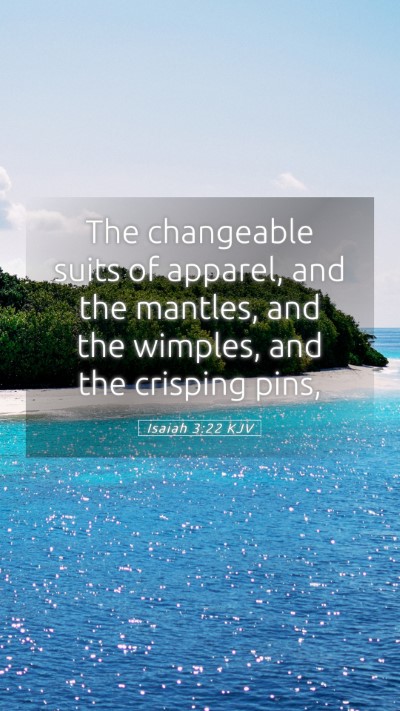Understanding Isaiah 3:22 - Bible Verse Commentary
Isaiah 3:22 reads: "The changeable suits of apparel, and the mantles, and the wimples, and the crisping pins." This verse is part of a larger passage that discusses the judgment and downfall of Jerusalem due to its inhabitants' pride and sinful behavior. The mention of various items of clothing symbolizes not just vanity, but also the superficial values that the people placed on outward appearances rather than inner righteousness.
Meaning and Interpretation
This scripture serves as a stark reminder of the consequences of abandoning God’s laws and prioritizing material possessions and external appearances over spiritual integrity. The insights from prominent public domain commentaries offer a deeper understanding of this verse:
- Matthew Henry Commentary: Henry emphasizes that this passage highlights the excessive focus on fashion and adornment by the women of Zion. He interprets their fixation on fine apparel as indicative of the moral decay and spiritual neglect that plagued society, which ultimately led to their downfall.
- Albert Barnes Commentary: Barnes elaborates on how Isaiah’s mention of specific items of clothing serves to illustrate the broader theme of pride and luxury. He suggests that these symbols reflect not only personal vanity but also social conditions whereby wealth and status are idolized, detracting from one's relationship with God.
- Adam Clarke Commentary: Clarke provides a detailed examination of the historical context, noting that the extravagant styles of clothing represent a distraction that draws individuals away from their duties to God and each other. He connects the judgment portrayed in this verse to the wider theological implications of seeking worldly pleasures over divine righteousness.
Bible Verse Meanings in Context
The verses surrounding Isaiah 3:22 delve into themes of divine judgment and societal collapse, specifically addressing the reasons behind God's impending punishment on Jerusalem. The focus on women's attire serves as a metaphor for the broader spiritual decay that had taken root among God's people. Here’s a closer look at the context:
- Contextual Analysis: The surrounding verses describe the lack of true spiritual leadership in Judah and the consequent moral failing of its people. This societal shift resulted in God’s decision to strip away the luxuries and comforts that had become sources of pride.
- Historical Context: At the time of Isaiah, the people had fallen into idolatry and corruption, leading to a society that elevated superficial values over genuine worship and piety. The judgment spoken of by Isaiah targets those who place their hopes on external appearances rather than on a life lived in accordance with God’s commandments.
- Prophetic Significance: Isaiah's prophecies often serve as a call to repentance and an invitation to return to true worship. In this verse, we see the practical implications of failing to heed such calls, with external beauty being worthless in the face of imminent judgment.
Application and Reflection
For modern readers, Isaiah 3:22 poses significant questions about our own values and priorities. It invites individuals to reflect on:
- Are we placing too much importance on material possessions or outward appearances?
- How can we foster a spirit of humility and righteousness in our daily lives?
- What steps can we take to ensure our priorities align with God’s will rather than societal expectations?
Cross References
This verse can be related to other passages that convey similar themes of judgment, pride, and the danger of valuing the superficial over the spiritual:
- 1 Peter 3:3-4: "Whose adorning let it not be that outward adorning of plaiting the hair, and of wearing of gold, or of putting on of apparel; but let it be the hidden man of the heart..."
- Proverbs 31:30: "Favor is deceitful, and beauty is vain: but a woman that feareth the Lord, she shall be praised."
- James 4:6: "But he giveth more grace. Wherefore he saith, God resisteth the proud, but giveth grace unto the humble."
Conclusion
In conclusion, Isaiah 3:22 offers profound insights into the dangers of misplaced priorities and the judgment that can follow. It serves both as a warning and a call to seek true beauty and worth in the eyes of God rather than through external means. For those engaging in Bible study groups or exploring online Bible study resources, this verse can spark meaningful discussions about the true nature of beauty and the importance of living a life centered on spiritual values.
As you continue your journey into understanding Scripture, remember that the interpretation of Bible verses like Isaiah 3:22 requires both historical context and personal reflection. Embrace the depths of biblical exegesis to uncover the wisdom and guidance contained within these sacred texts.


